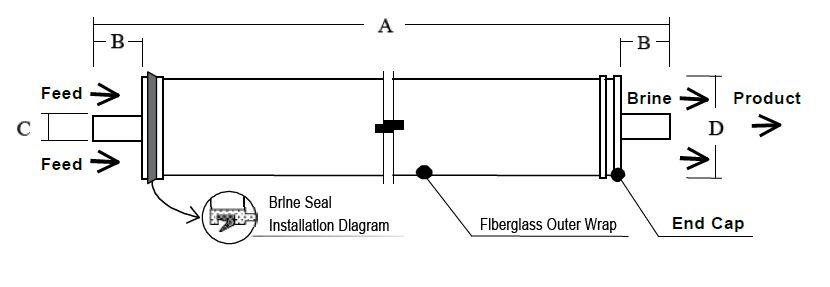PRODUCTS RO membranes
2.5" Spiral Wound Elements for Brackish Water
Introduction:
Low Pressure, High Productivity:
2.5” Spiral Wound Elements for Brackish Water
Hydro-Flex reverse osmosis (RO) 4″ elements are some of the finest products in the industry. The state of the art coating line,
coupled with advanced membrane technology, yields product of the highest quality and most stable performance. Hydro-Flex
elements are uniquely engineered to have a high level of salt rejection with minimum compromise in water flux.
Description:
Membrane material: Polyamide thin film composite
Spirally wound element
Tape-Wrapped
Low, ultra-low or extreme-low pressure application for brackish
water treatment
Specifications:
| Product | Active area ft2 (m2) | Feed spacer thickness mil(mm) | Permeate flow rate gpd(m3/d) | Stabilized salt rejection (%) | Minimum | Test Conditions |
| FX-2540-ULP | 30(2.8) | 28(0.7) | 750(2.84) | 99.0% | 98.0% | 150psi/1500ppm |
| FX-2521-ULP | 14(1.3) | 28(0.7) | 300(1.13) | 99.0% | 98.0% | 150psi/1500ppm |
1. All performance data are collected at 25°C (77°F), NaCl solution, pH7.5 and recovery rate FX-2540-ULP 15%, TX-2521-ULP 8%.
2. Permeate flows for single element may vary ±15%.
Element Dimension:

| Product | Recovery Rate % | Dimensions – Inches (mm) | |||
| A | B | C | D | ||
| FX- 2540 | 15 | 40.0 (1016) | 1.10 (28.6) | 0.75 (19.1) | 2.4 (61) |
| FX- 2521 | 8 | 21.0 (508) | 1.10 (28.6) | 0.75 (19.1) | 2.4 (61) |
* 1 inch= 25.4 mm
Operating Limits for Design:
Maximum Operating Temperature………..…………………….……45°C(113°F)
Maximum Operating Pressure………………..…….………….….….600psi(41bar)
Maximum Pressure Drop (single element)…………………………...15psi(1.0bar)
pH Range for Continuous Operation………………..........................3-11
pH Range for Cleaning………………………………...………………1.5-12
Chlorine tolerance………………………………………………………<0.1ppm
Maximum Feed SDI…………………………………...……….....…….5
Important Operation Notes:
• It is critical to follow approved start-up procedure to prevent membrane damage due to overfeeding or hydraulic shock.
Before initiating system, loading of the RO elements, instrument calibration, membrane pretreatment and other system
checks should be conducted.
• Minimize any pressure shock or cross-flow fluctuation on the spiral elements at all times. During start-up, a gradual,
incremental change from a standstill to operating state is recommended.
• Maximum pressure drop across an entire pressure vessel (housing) is 50psi (3.4 bar).
• No static pressure should ever be built up on permeate side.
• Keep elements moist at all times after initial wetting.
• If operating limits and guidelines are not followed, the Limited Warranty will be void.
• In case of prolonged system shutdowns, it is recommended that membrane elements be immersed in a preservative
solution to prevent bacteria growth.
• Permeate collected from first hour of operation should be discarded.
• It is customer’s responsibility to make sure that the chemicals and lubricants do not have detrimental effects
on RO elements.




